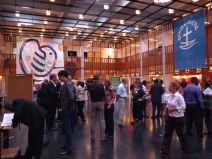WCC 'Moving Ahead' at Conclusion of Geneva 2009

The World Council of Churches' Central Committee meeting 2009 closed on Wednesday in a spirit of unity, despite several days of heavy deliberation and decision making, according to the organization's moderator.
"I have gratitude for this meeting," Altmann shared in a press briefing. "We had a heavy agenda, many important decisions had to be taken, but they were done so with a strong feeling of belonging together and a strong feeling of moving ahead.
"I am convinced throughout this meeting the fellowship of the churches have been strengthened."
The eight-day conference, which saw election of new leadership, confirmation of the 2013 Assembly venue, and the issuance of several significant public statements, began in celebratory fashion, with the election of the WCC's new General Secretary, Norwegian pastor and theologian Olav Fykse Tveit, and a farewell ceremony honoring the organization's current head, Rev. Dr. Samuel Kobia.
Tveit, 48, who is the youngest leader for the WCC in over 70 years, stressed the importance of unity in his first address as general secretary elect, referencing Jesus' prayer in the Gospel of John that "that they may be one."
"We are living in a time when there is a strong need for inter-Christian solidarity in this world," Tveit said before the Committee. "There are many Christians living in minority situations but also in situations where they are part of the suffering world, which calls for solidarity, for accompanying, and for advocacy between Christians and with one another."
Tveit also commented on his willingness to work with non-WCC Christian groups including Evangelicals, Pentecostals, and the Roman Catholic Church.
"I would say there is a mutual opening of conversation and I think we should make strong efforts to continue that," he said.
The Committee's actions following Tveit's address seemed to be in agreement with the new secretary, as organizers of the WCC's 2013 Assembly, voted to be held in Busan in South Korea, expressed a similar sentiment in making the upcoming gathering more pluralistic.
"Moving together towards a wider Christian family, a wider global Christian forum – that is our goal and we are moving towards this goal," said Dr. Jong-wha Park of the assembly organizing committee during a press briefing.
"That's why Pentecostals are invited, evangelicals are invited, ecumenicals are invited to Korea. This is the clear sign that we are working towards a wider ecumenical solidarity."
Alongside these proposals, the Central Committee also drafted several significant public issue statements including the crisis in Darfur, misuse of the blasphemy law in Pakistan, and eco justice and the ecological debt, among others.
The Committee's statement on Darfur characterized the crisis as a "moral challenge for the international community," and condemned the six-years of violence in the region as, "mass atrocities committed against innocent civilians in Darfur." The statement also made a call to the church to "assume their pioneering role and raise the prophetic voice with regard to the Darfur crisis," and ended by encouraging all Christians to pray for peace in the region.
Regarding the use of the "blasphemy law" in Pakistan, the WCC made a direct plea to the Pakistani government to repeal the law, which carries a mandatory death penalty.
The statement read that the Committee, "calls upon the government of Pakistan to guarantee the rights of all religious minorities in the country."
"We also call on WCC member churches to request their respective governments to express their concerns on the security of religious minorities in Pakistan," the statement continued.
On the issue of the eco justice and the ecological debt, which refers to the damage caused over time to ecosystems, places and peoples through production and consumption patterns, the WCC made a call to its member churches to urge government action on the issue, as well as to assess their own compliance with promoting the "recompense of ecological debt."
The statement specifically mentioned the United Nations Framework Convention on Climate Change's (UNFCC) December 2009 meeting in Copenhagen as a critical event on the issue.
Geneva 2009 is the third meeting of the WCC's the Central Committee, a decision making body of the World Council of Churches comprised of nearly 150 representatives.